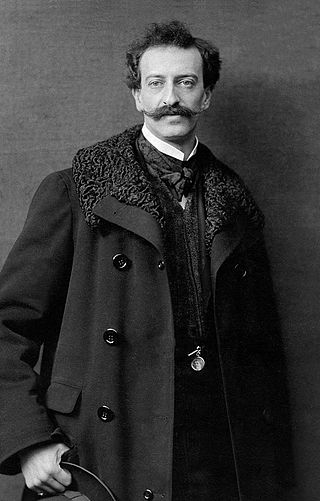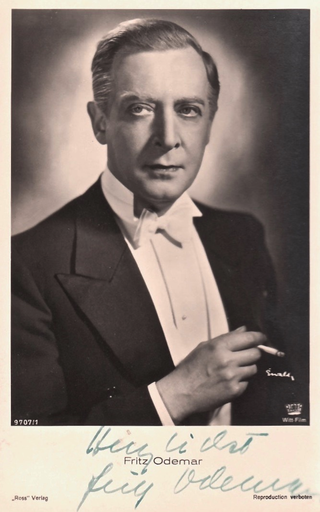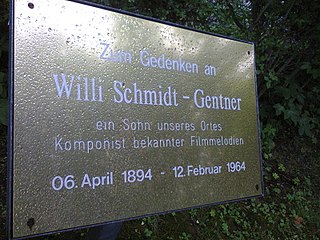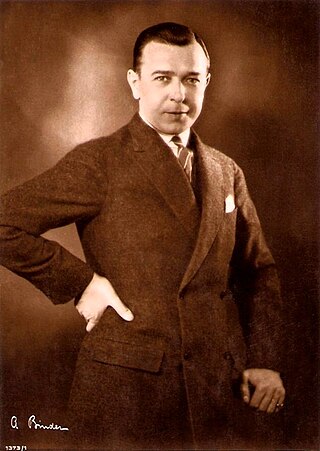Related Research Articles

Juliane "Liane" Haid was an Austrian actress and singer. She has often been referred to as Austria's first movie star.

Oscar Nathan Straus was a Viennese composer of operettas, film scores, and songs. He also wrote about 500 cabaret songs, chamber music, and orchestral and choral works. His original name was actually Strauss, but for professional purposes he deliberately omitted the final 's'. He wished not to be associated with the musical Strauss family of Vienna. However, he did follow the advice of Johann Strauss II in 1898 about abandoning the prospective lure of writing waltzes for the more lucrative business of writing for the theatre.
Oskar Sima was an Austrian actor who is best remembered for appearing in supporting roles in countless comedy films from the 1930s to the 1960s.

Robert Elisabeth Stolz was an Austrian songwriter and conductor as well as a composer of operettas and film music.

Géza von Bolváry was a Hungarian actor, screenwriter, and film director, who worked principally in Germany and Austria.

Marta Eggerth was a Hungarian actress and singer from "The Silver Age of Operetta". Many of the 20th century's most famous operetta composers, including Franz Lehár, Fritz Kreisler, Robert Stolz, Oscar Straus, and Paul Abraham, composed works especially for her.

Willi Forst, born Wilhelm Anton Frohs was an Austrian actor, screenwriter, film director, film producer and singer. As a debonair actor he was a darling of the German-speaking film audiences, as a director, one of the most significant makers of the Viennese period musical melodramas and comedies of the 1930s known as Wiener Filme. From the mid-1930s he also recorded many records, largely of sentimental Viennese songs, for the Odeon Records label owned by Carl Lindström AG.

Fritz Odemar was a German film actor. He appeared in more than 150 films between 1927 and 1955. He was born in Hannover, Germany and died in Munich, West Germany. Odemar's father was the actor Fritz Odemar Sr..

Willy Schmidt-Gentner was one of the most successful German composers of film music in the history of German-language cinema. He moved to Vienna in 1933. At his most productive, he scored up to 10 films a year, including numerous classics and masterpieces of the German and Austrian cinema.
Harry Hardt was an Austrian actor. The son of a military officer, he initially planned a military career for himself, studying at a military academy and serving during World War I. He later turned to acting, having a long career both in films and on television.

Paul Hörbiger was an Austrian theatre and film actor.

Ernő Verebes was a Hungarian-American actor who began his career in Hungarian silent films in 1915. During his film career he worked and lived in Hungary, Germany and in the United States. He was born into a Hungarian emigrant family in New York, but his family later returned to Austria-Hungary.

Paul Heidemann was a German actor, comedian, film director, film producer, and opera singer. As a performer, he excelled in various genres and was especially noted for his comedic skills
Hans May was an Austrian-born composer who went into exile in Britain in 1936 after the Nazis came to power in his homeland, being of Jewish descent.

Georg Alexander was a German film actor who was a prolific presence in German cinema. He also directed a number of films during the silent era.

Anton Pointner was an Austrian stage and film actor. Pointner's career began on the stages of Austria and he performed in both silent and sound films in his native Austria, as well as in Germany and the United States.
Alfred Neugebauer was an Austrian film actor.

Gretl Theimer was an Austrian actress.
Carl Drews was a German cinematographer.
Willi Herrmann (1893–1968) was a German art director.
References
- ↑ Hardt (1996), p. 130.
- ↑ Phillips (2004), p. 63.